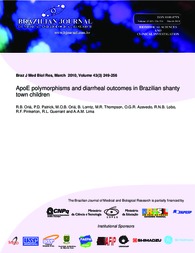ApoE polymorphisms and diarrheal outcomes in Brazilian shanty town children.
ApoE polymorphisms and diarrheal outcomes in Brazilian shanty town children.
Summary: A series of studies have shown that the heavy burdens of diarrheal diseases in the first 2 formative years of life in children living in urban shanty towns have negative effects on physical and cognitive development lasting into later childhood. We have shown that APOE4 is relatively common in shanty town children living in Brazil (13.4%) and suggest that APOE4 has a protective role in cognitive development as well as weight-for-height in children with heavy burdens of diarrhea in early childhood (64/123; 52%), despite being a marker for cognitive decline with Alzheimer?s and cardiovascular diseases later in life. APOE2 frequency was higher among children with heaviest diarrhea burdens during the first 2 years of life, as detected by PCR using the restriction fragment length polymorphism method, raising the possibility that ApoE-cholesterol balance might be critical for growth and cognitive development under the stress of heavy diarrhea burdens and when an enriched fat diet is insufficient. These findings provide a potential explanation for the survival advantage in evolution of genes, which might raise cholesterol levels during heavy stress of diarrhea burdens and malnutrition early in life.
Publication year: 2010
Types of publication: Journal article
Unit: Embrapa Goats & Sheep
Keywords: Apolipoprotein E, Children, Diarrhea, Malnutrition
Observation
Some of Embrapa's publications are published as ePub files. To read them, use or download one of the following free software options to your computer or mobile device. Android: Google Play Books; IOS: iBooks; Windows and Linux: Calibre.
Access other publications
Access the Agricultural Research Database (BDPA) to consult Embrapa's full library collection and records.
Visit Embrapa Bookstore to purchase books and other publications sold by Embrapa.

